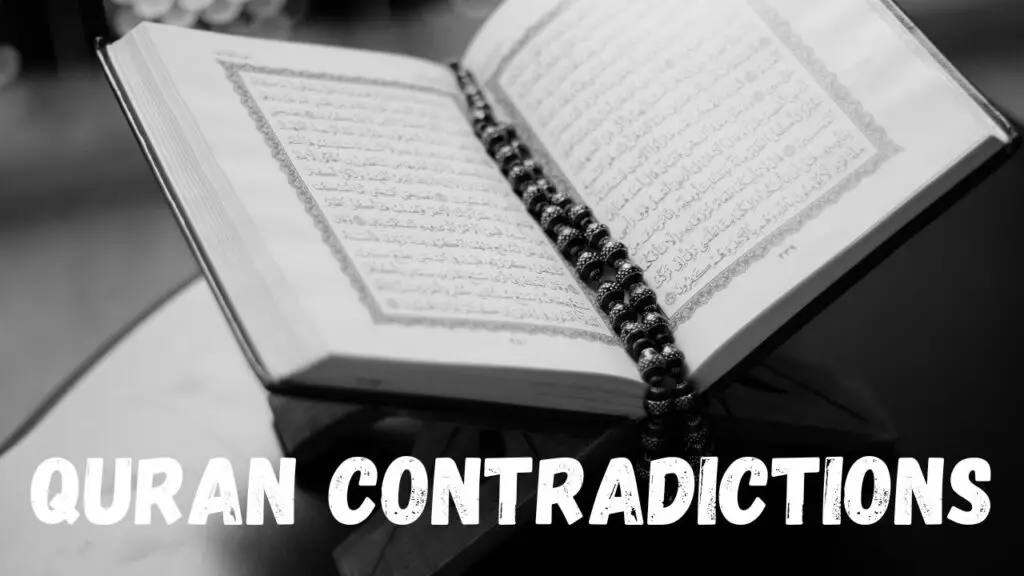Quran Contradictions | Debunking Misconceptions | 2023
Debunking Misconceptions About Quranic Contradictions

Quran Contradictions
Quranic contradictions refer to apparent inconsistencies or contradictions found in the Quran, the holy scripture of Islam. These contradictions are often raised as points of contention by critics and skeptics of the Quran.

- Is Dropshipping Halal? Understanding the Islamic Perspective 2023
- Can You Secretly get Married in Islam? | Unlocking the Secrets of Nikah | 2023
- Is It Haram to Eat Horse Meat? Understanding the Islamic Perspective
- Islamic Law of Inheritance
- Islamic Holidays
Introduction of Quran Contradictions
The Quran, the holy book of Islam, is considered by Muslims to be the ultimate source of divine guidance and wisdom. It is revered as the literal word of God, revealed to the Prophet Muhammad over a period of 23 years. However, like any ancient religious text, the Quran has been subject to scrutiny and criticism, with some critics claiming that it contains contradictions. In this article, we will examine some of the alleged contradictions in the Quran and provide a perspective that may help shed light on these apparent inconsistencies.
The Nature of Quran Contradictions

Before delving into specific examples, it’s essential to understand that the term “contradiction” can be misleading when applied to religious texts. What may initially appear as a contradiction often stems from differences in context, interpretation, or linguistic nuances. Scholars and theologians argue that the Quran is a complex and layered text, and understanding it requires careful study, historical context, and knowledge of classical Arabic.
Examples of Quran Contradictions
- Violence and Peace: Critics often point to verses that seem to promote both violence and peace. For instance, some verses speak of peaceful coexistence and tolerance (e.g., Surah Al-Kafirun 109:6), while others discuss defensive warfare (e.g., Surah Al-Baqarah 2:190-193). However, these verses must be understood in their historical context. The Quran allows for self-defense but emphasizes peaceful resolution whenever possible.
- The Timing of Creation: Critics argue that the Quran provides conflicting accounts of the creation of the universe. Surah Al-Fussilat 41:9-12 suggests that the Earth was created before the heavens, while other verses (e.g., Surah Al-Baqarah 2:29) seem to imply the opposite. Islamic scholars reconcile this by explaining that the Quran uses different perspectives to emphasize the harmonious order of creation.
- Inheritance Laws: Some critics contend that the Quran’s inheritance laws are inconsistent, particularly regarding the distribution of inheritance among family members. Islamic jurisprudence addresses these apparent contradictions by specifying rules and guidelines for inheritance distribution based on various scenarios and relationships.
- The Number of Days of Creation: The Quran mentions that God created the heavens and the Earth in six days (Surah Al-A’raf 7:54), while other verses suggest that the creation occurred in two days (Surah Fussilat 41:9-12). Islamic scholars reconcile this by explaining that the Quranic narrative is not necessarily a strict chronological account but rather a symbolic representation of the stages of creation.
- Alcohol Prohibition: Critics argue that the Quran is inconsistent in its stance on alcohol. While Surah Al-Baqarah 2:219 initially permits the consumption of alcohol in moderation, it later prohibits it (Surah Al-Ma’idah 5:90-91). Scholars explain that the initial allowance was a transitional phase to gradually discourage alcohol consumption, ultimately leading to its prohibition.

What are ‘Quranic contradictions’?
Quranic contradictions refer to apparent inconsistencies or contradictions found in the Quran, the holy scripture of Islam. These contradictions are often raised as points of contention by critics and skeptics of the Quran.
Can you provide an example of a Quranic contradiction?
One example often cited is the issue of alcohol. Some verses in the Quran discourage the consumption of alcohol, while others initially allowed it before later prohibiting it. However, this is not a contradiction but reflects the concept of progressive revelation.
What is progressive revelation, and how does it relate to Quranic contradictions?
Progressive revelation means that the Quran was revealed over a period of 23 years in response to various situations and needs. Some verses were revealed earlier and modified or supplemented by later revelations. What may seem like contradictions can often be understood in the context of this gradual revelation process.
How do scholars and Muslims address Quranic contradictions?
Scholars and Muslims generally address Quranic contradictions by studying the Quran holistically, considering context, interpretation, and the broader message. They seek to reconcile apparent contradictions through an in-depth understanding of Islamic jurisprudence and the Quranic text.
Are there any contradictions in the Quran that remain unresolved?
While there may be verses that are challenging to interpret, Muslim scholars have spent centuries studying and addressing apparent contradictions. Many alleged contradictions have been resolved through scholarly consensus, interpretation, and understanding the Quran’s context.
Reconciling Alleged Contradictions
To understand these apparent contradictions better, one must consider several factors:

- Context: Context plays a pivotal role in interpreting Quranic verses. Historical context, the reason for revelation (Asbab al-Nuzul), and the broader Quranic narrative should be considered.
- Abrogation: Islamic scholars acknowledge the concept of abrogation (Naskh), wherein later revelations can supersede earlier ones. This is seen as a means to adapt divine guidance to changing circumstances.
- Interpretation: The Quran allows for various interpretations (Tafsir) by qualified scholars, as long as they adhere to the principles of Islamic jurisprudence (Usul al-Fiqh).
- Language and Nuance: Classical Arabic, in which the Quran was revealed, is rich in nuance and metaphor. Many apparent contradictions can be resolved through a deep understanding of the language.
Conclusion of Quran Contradictions
While some critics assert that the Quran contains contradictions, a closer examination often reveals that these apparent inconsistencies can be reconciled through careful analysis of context, interpretation, and linguistic nuances. Islamic scholars have dedicated centuries to studying the Quran and providing insights into its verses, striving to harmonize its messages. Ultimately, the Quran remains a central source of guidance and inspiration for Muslims worldwide, and its perceived contradictions should be understood within the broader context of Islamic scholarship and theology.

Is it acceptable to question Quranic verses and seek clarification?
Yes, Islam encourages critical thinking and seeking knowledge. Muslims are encouraged to ask questions and seek clarification about the Quranic verses. Scholars and knowledgeable individuals are often available to provide explanations and guidance.
How can one gain a deeper understanding of the Quran to address alleged contradictions?
Gaining a deeper understanding of the Quran requires studying the Quran with the help of reputable Islamic scholars, reading tafsir (commentaries), and exploring the historical and cultural context in which the verses were revealed. It’s essential to approach the Quran with an open and respectful mindset.
Are there any resources available to learn more about Quranic contradictions?
Numerous books, online courses, and Islamic scholars provide resources to study and understand the Quran and its alleged contradictions. Seek guidance from reputable sources to navigate these topics with accuracy and respect for the Islamic faith.
What is the overall message of the Quran despite alleged contradictions?
The Quran’s primary message revolves around monotheism, morality, social justice, and guidance for human conduct. Despite alleged contradictions, Muslims believe that the Quran is a source of divine guidance that provides a moral and ethical framework for their lives.
How can discussions about Quranic contradictions contribute to a better understanding of Islam?
Honest and respectful discussions about Quranic contradictions can lead to a deeper understanding of Islam, its scripture, and its beliefs. They can foster interfaith dialogue and help dispel misconceptions about the Quran.





